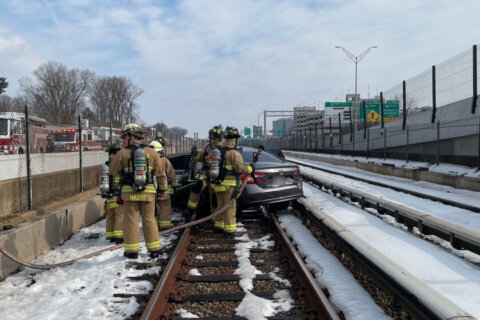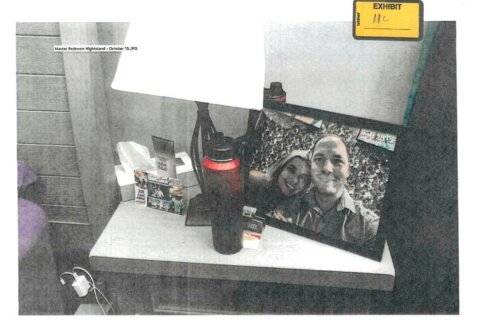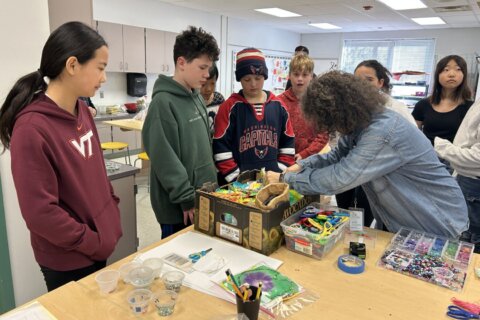A new report from the Fairfax County, Virginia, school system, reveals 459 students were written up for cellphone violations during the first semester of the current school year.
The report comes several months after Fairfax County Public Schools updated its Student Rights and Responsibilities handbook to include a policy to explicitly bar cellphone use during class time.
The report says the relatively low number of documented infractions “may indicate that students have adapted to the new expectation and are generally compliant with the cell phone responsibility outlined in the SR&R.”
In four listening sessions with students and staff, the report says, “There was a consensus that the new cell phone expectations are valuable.”
‘It should be about learning, not punishment’
The systemwide policy on cellphone use is similar to what had been in place at West Potomac High School years before the county made it a requirement.
During the 2018-19 school year, several teachers at West Potomac High School came together to address what they felt was an ongoing problem: students who were disengaged and distracted by their cellphones during class time.
At the time, the countywide policy was broad, Principal Tanganyika Millard said. It didn’t explicitly say that students couldn’t have their phones out during class time, but teachers were still able to prohibit phone use during class. But, Millard said, many teachers had different approaches to regulating cellphone use, and some didn’t want to get into an argument with students.
In the summer before the 2019-20 school year, a large group of teachers approached Millard, eager to create a policy that would have all of the school’s teachers on the same page regarding cellphone use. When the school year started, the school implemented a policy that banned cellphone use during instructional time. It was initially met with backlash, but students have since conceded that it helps them focus on their work.
Millard said the number of infractions documented in the new report could be smaller than what’s actually occurring, because some teachers may issue warnings before documenting a violation and because a new referral system was rolled out this year.
“Every piece of discipline that we do is a tiered process, because it should be about learning, not punishment,” Millard, who’s also president of the High Schools’ Principal Association, said. “I’m almost sure that there’s that piece in play where first warning, I’m just telling you, second warning, you will have to talk to an administrator, third warning there might be a call home, before you get to the place where it’s, ‘I’m putting this in and I’m taking your phone’ kind of thing.”
At West Potomac, Millard said teachers developed their own Google Form for referring cellphone issues. Once a student reached a certain threshold of violations, the phone would either be taken away and parents would have to pick it up, or it would be returned to the student at the end of the school day.
‘Massive FOMO’
Kids initially pushed back, “because it was their thing. It was more about a comfort level of them being able to have their phone and this massive FOMO that they would have, that if I can’t see what’s happening live that I’m missing out on something,” Millard said.
But, by the end of the school year, Millard said, “When we would call about the phones and say we have your kid’s phone, [parents] would say, ‘Good, keep it.’ They would take their time coming back to get it, or were sick of the phones with their kid as well.”
Some students said the new policy helped them concentrate. It still enabled them to use phones before and after school, between classes and during lunch. Teachers also felt supported, because the same policy was in place in every classroom.
“A lot of the problems and fights and any of the other things that started with the cellphone kind of diminished,” Millard said.
Even after the pandemic, Millard said, students were used to the cellphone policy, and had laptops if needed. During lunch, “it took us a few weeks to realize these kids are actually talking to each other, nobody’s on their phone,” she said.
There’s flexibility, Millard said, for students whose parents need to speak to them during the school day, though she described those circumstances as rare.
“The majority of the response, especially from parents, was that, ‘Yeah, they need to be paying attention,'” Millard said.
Ahead of next year, the school system is considering addressing things such as AirPods, earbuds, headsets and other devices that can be connected to phones.
The report also recommends a tiered approach to violations of the cellphone policy, which would include a reminder after a first offense, a call home after the second offense and a referral for the third offense.
A vote on changes to the student handbook, which includes the cellphone policy, is scheduled for May.








